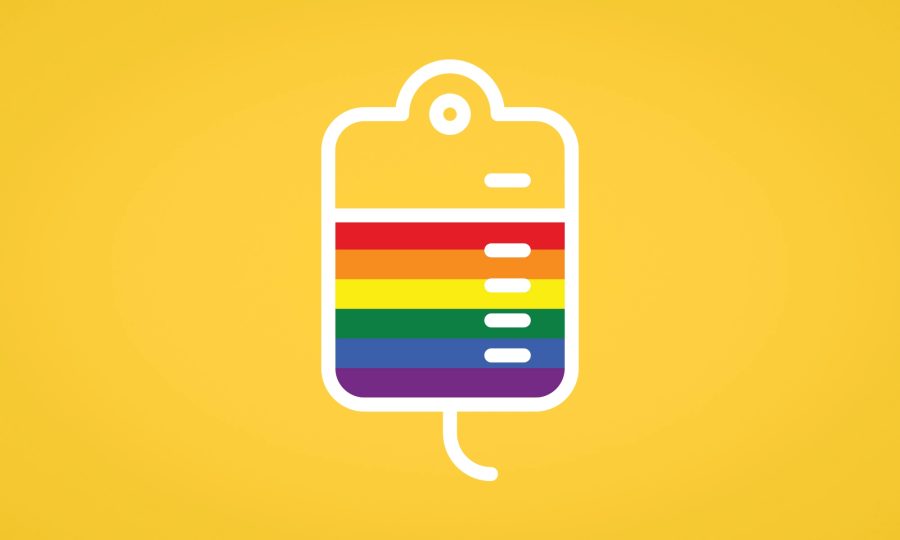The season 18 finale of “Grey’s Anatomy” tackles the issue of gay men not being able to give blood. For such a niche issue, why is this topic getting more and more national attention in America? Well first, it’s important to emphasize that we are in a national blood shortage due in part to the residual and ongoing impacts of COVID and the many mass shootings that have affected our country. According to US News, since March 2020 there has “been a 10 percent decrease in overall blood donations” alongside a “62% drop in college and high school blood drives” due to COVID. Because of this, there has been a drop in the percentage of student donors, down to “just 10%” from “25% of donors in 2019.” As blood is getting scarcer to come by and many factors make it more vital than ever, the Red Cross is reportedly “pleading for donors as it grapples with its worst blood shortage in more than a decade.” This shortage is in stark contrast to the discriminating palate of regulators in the United States who determine who can donate blood.
In 1985, at the height of the AIDS epidemic, the FDA established a lifetime ban from blood donation for MSM (men who have sex with men). This was later amended to a year long deferral in December 2015 for MSM who have sexual contact in the past 12 months. They believed that this pre-screening eliminates 90 percent of the risk for donors who may be carrying bloodborne diseases. This period was further shortened to 90 days in April 2020 at the start of the pandemic and will likely persist after it ends, as outlined in the FDA revised guidance. In the past decade, the policy has gone from an outright ban to a requirement of seasonal celibacy. This discrimination is an antiquated remnant of ‘80s homophobia. AIDS was originally termed GRID, or Gay-Related Immune Deficiency, even though the disease is not endemic to the population, just more common. There has been a long-standing legacy in medicine of avoiding, discounting, and alienating queer people. One step towards repairing that legacy is amending these unnecessary qualifications to better suit scientific standards and risk.
Advocates like those in the Human Rights Campaign (HRC), find the FDA’s steps toward making it easier for MSM to give blood promising, but that they don’t go far enough. Due to the inconsistent weight and risk of sexual acts that are restricted in blood donation, the HRC has “strongly encouraged the FDA to revise the donor questionnaire based on an individual risk assessment of sexual behaviors upon which all donors are evaluated equally, without regard to sexual orientation or gender identity.” They point out that a single instance of protected oral sex betwee two men in the last three months is a disqualifier, but that a lesbian or heterosexual person could have many sexual partners in that period, while being unaware of their partners’ sexual histories, and still be able to give blood. This double standard highlights that the priority of the FDA is not in risk reduction. If they cared about minimizing the risk of blood related diseases, the standards would be better suited to fit outside of simply one’s sexual preference. Although blood testing is not 100 percent precise, many believe that there are better ways to screen donations that don’t arbitrarily disclude people, while simultaneously allowing for more blood donation to fill the growing need. According to the HRC, in the “approximately 12 million units donated each year, 10 HIV-infected units have slipped through.” With better, more individualized screenings I believe that the number of these transmissions can be made negligible and the amount of units of blood donated greatly increased.
Personally, I have donated blood since the day of my 16th birthday. Like many of my peers, I recognized the need in my community and in our country in general. I was happy going in every few months to give my blood. I felt like I was making a positive difference. But, as I simultaneously grappled for a better understanding of my sexuality, I found myself unable to participate in these blood drives. The required questionnaires they had me fill out put risk factors such as drug use, sharing needles, and prostitution alongside gay sex. This made me feel that my identity as a gay man was just as socially taboo and morally questionable as these other risk factors. It’s worth pointing out that the FDA’s definition of MSM does not change for monogamous and/or protected sex and has no consideration for PrEP (pre-exposure prophylaxis) use, which has been shown to greatly reduce the chances of a HIV infection.
My parents have faced a similar ban from donating blood because they both lived in Ireland during the outbreak of Creutzfeldt-Jakob Disease (or mad-cow disease) in Europe. This example is especially poignant because it represents a similar outbreak among a subpopulation with increased risk. However, as of May 2022, the FDA amended its guidelines on this particular disqualifier to “remove the recommendations to defer indefinitely blood donors” who were previously deferred due to their proximity to the outbreak. This is to say that the FDA is not unmalleable in their restrictions. They are, albeit slowly, able to change and correct their recommendations based on scientific consensus.
Many people find the MSM ban to be redundant and unnecessary such as Dr. Gerald E. Harmon, president of the American Medical Association (AMA), who believes that “the lifetime ban was imposed in an era when HIV was poorly understood, and it persisted for decades even as blood-screening technology improved dramatically.” He points to the fact that today, “every unit of donated blood is rigorously tested to detect any trace of HIV, syphilis, hepatitis, West Nile virus or other blood-borne diseases.” He argues that the goal of the FDA should be in “ensuring that blood donation criteria are applied equitably across all segments of our population, including the LGBTQ+ community, based on the latest scientific evidence.”
As this issue gains more attention and the need for blood is ever present, more people are realizing that the FDA must change their guidance to better suit scientific basis. Personally, I think that barring MSM from blood donation is harmful both because it limits greater blood supply and exists as a memory of a time when we had much less knowledge and much less testing for blood related diseases. There are several countries around the world who are coming to realize this inequity, such as the United Kingdom who changed their policy in June of last year to remove the waiting period. My hope is that ours will be the next to come and will usher in worldwide progress on this issue.
Image courtesy of Emily Pidgeon at TED.














